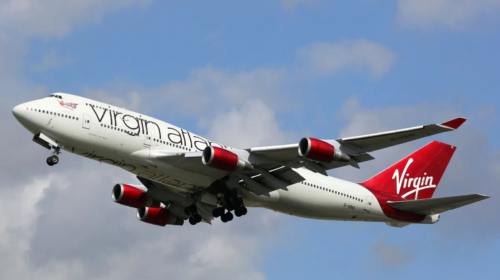The United Kingdom government has announced that Virgin Atlantic will fly a historic net zero London-New York flight in 2023.
Virgin Atlantic won a competition to receive government funding for the first net-zero transatlantic flight, according to an official press release by the U.K. State on Friday.
“For decades, flying from London to New York has symbolized aviation’s ability to connect people and drive international progress. It’s now going to be at the forefront of cutting carbon emissions from flying,” said British transport secretary Mark Harper.
Not only will this flight pave the way for future generations, but it will demonstrate just how much we can achieve when we work together on a shared goal – bringing together some of the best businesses and academics in the world and led by a British airline.”
Rolls-Royce Trent 1000 engines will power the airline’s flagship Boeing 787s as they fly from London Heathrow to New York.

However, this will not be a typical commercial airline flight; rather, it will be the first passenger flight in the history of commercial aviation that uses only sustainable aviation fuel (SAF).
This flight is anticipated to be powered by SAF, which is mostly made from used cooking oil and other waste oils and fats.
Compared to conventional fossil jet fuel, SAF can reduce lifecycle carbon emissions by nearly 70% when entirely replacing aviation kerosene.
The usage of 100% SAF along with carbon removal using credits for biochar, a substance that captures and stores carbon removed from the atmosphere, will result in a net-zero flight.
The aviation sector, which is among the hardest to decarbonize, could be among the leading emitters of greenhouse gases by the year 2050 if no quick, coordinated action is taken.
To fight this, the U.K. government published the Jet Zero strategy in July 2022, outlining an approach to decarbonizing the sector and highlighting SAF as one of the primary strategies for achieving Jet Zero.
In commercial jet engines today, a maximum of 50 percent SAF combined with kerosene is allowed. The collaboration will show the ability to decarbonize long-haul routes by using 100 percent SAF, moving the world one step closer to net-zero aviation.
“This challenge recognizes the critical role that SAF has to play in decarbonizing aviation and the urgent collective action needed to scale production and use of SAF globally, said Shai Weiss, CEO of Virgin Atlantic.
“The research and results will be a huge step in fast-tracking SAF use across the aviation industry and supporting the investment, collaboration, and urgency needed to produce SAF at scale. Our collective ambition of net zero by 2050 depends on it.”
High fuel production costs, technology risk at the commercial scale, and feedstock availability are additional barriers to a greater uptake of SAF.
To ensure a stable and expanding market, the U.K. will enact a SAF mandate mandating at least 10 percent of jet fuel to be produced from sustainable sources by 2030.
The U.K. will invest in a domestic SAF industry through the £165 million advanced fuels fund, and work with the industry and investors to understand how to secure long-term investment into the sector.
These steps are made in an effort to support the SAF’s expanding involvement in future commercial aviation, said the press release.
Meanwhile, Rachael Everard, Head of Sustainability, Rolls-Royce proud that Trent 1000 engines will power the first-ever flight using 100 percent SAF across the Atlantic.
“This represents an incredible milestone for the entire aviation industry in its journey towards net zero carbon emissions,” he said.
“The Trent 1000 can already be flown with a 50% blend of SAF on commercial flights and by the end of 2023 we will have proven that our whole family of Trent engines and business aviation engines are compatible with 100% SAF,” he added.
In 2019, air travel contributed 915 million tonnes of CO2 to the 43 billion tonnes of CO2 produced by humanity worldwide.
However, SAF-powered planes offer hope for future greener flights to an industry that now emits 2.1 percent of global carbon emissions yearly.







